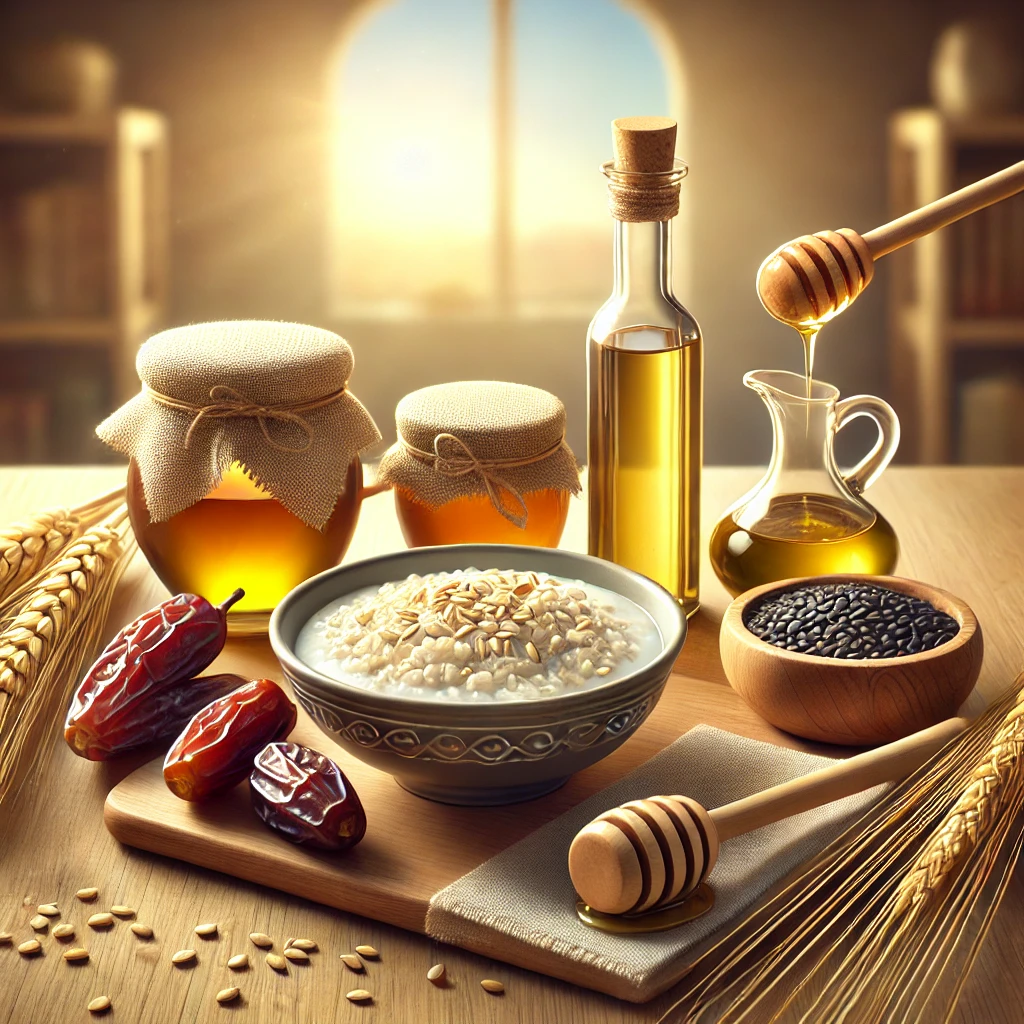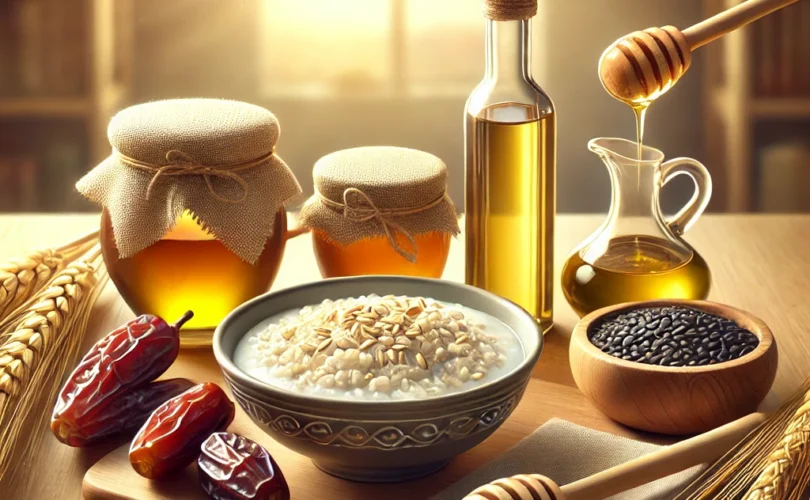As -Salamu-Alaikum !
In recent years, the term “Prophetic Diet” has gained attention for its holistic approach to health and wellness. Rooted in the teachings of Prophet Muhammad ﷺ, this way of eating emphasizes not just the foods consumed but also the habits, intentions, and spiritual aspects of nourishment. The Prophetic Diet is not a fad or a strict regimen; it is a timeless lifestyle that balances physical health with spiritual fulfillment.
This article explores what the Prophetic Diet entails, its key principles, and how you can incorporate it into your daily life for a healthier and more meaningful relationship with food.

The Foundation of the Prophetic Diet
The Prophetic Diet is derived from the teachings and practices of Prophet Muhammad ﷺ, as recorded in the Quran and Hadith (sayings of the Prophet). These teachings provide guidelines on what to eat, how to eat, and the spiritual mindset to adopt while eating. The overarching principles of the Prophetic Diet include:
- Moderation:
- The Prophet ﷺ emphasized eating in moderation, stating: “The son of Adam does not fill a vessel worse than his stomach. It is sufficient for the son of Adam to eat a few mouthfuls to keep him going. If he must, then one-third for his food, one-third for his drink, and one-third for his breath” (Tirmidhi).
- Wholesome Foods:
- The Quran encourages consuming “Tayyib” (pure and wholesome) foods. These are natural, unprocessed, and beneficial for the body.
- Mindful Eating:
- Eating slowly, chewing thoroughly, and being grateful for the food are all emphasized in the Sunnah.
- Fasting:
- Fasting, particularly during Ramadan and on specific days throughout the year, is an integral part of the Prophetic lifestyle. It benefits both the body and the soul.
Key Foods in the Prophetic Diet
The Prophet Muhammad ﷺ often consumed simple, natural foods that were readily available. These foods are now recognized for their incredible health benefits:
- Dates:
- Dates were a staple in the diet of the Prophet ﷺ. He said: “A house without dates has no food” (Muslim).
- Rich in fiber, natural sugars, and essential minerals like potassium, dates are an excellent source of energy and nutrition.
- Honey:
- The Prophet ﷺ said: “Make use of two remedies: honey and the Quran” (Ibn Majah).
- Honey is a natural antioxidant and antimicrobial agent that supports overall health.
- Olive Oil:
- The Prophet ﷺ advised: “Eat olive oil and anoint yourselves with it, for it comes from a blessed tree” (Tirmidhi).
- Olive oil is rich in healthy fats and has anti-inflammatory properties.
- Barley:
- Known as “Talbina” when cooked as a porridge, barley was often used by the Prophet ﷺ for its soothing and healing properties.
- It is high in fiber and beneficial for digestion and heart health.
- Milk:
- The Prophet ﷺ often drank milk, describing it as a complete food. It provides essential nutrients like calcium, protein, and vitamin D.
- Water:
- The Prophet ﷺ encouraged drinking water in sips rather than gulps and always praised Allah for it. Staying hydrated is vital for overall health.
Habits of the Prophetic Diet
In addition to specific foods, the Prophetic Diet places great emphasis on how and when to eat:
- Begin with Bismillah and End with Alhamdulillah:
- Starting a meal by saying Bismillah (In the name of Allah) and ending with Alhamdulillah (All praise is due to Allah) fosters gratitude and mindfulness.
- Eat with the Right Hand:
- The Prophet ﷺ advised eating with the right hand and sharing food with others whenever possible.
- Share Your Food:
- The Prophet ﷺ said: “The food of two people is sufficient for three, and the food of three people is sufficient for four” (Bukhari).
- Sharing food builds community and reduces waste.
- Avoid Overeating:
- Overeating is discouraged in Islam. The Prophet’s ﷺ simple meals serve as a reminder to focus on quality over quantity.
- Fasting:
- Beyond Ramadan, fasting on Mondays and Thursdays or the White Days (13th, 14th, and 15th of the lunar month) is highly recommended.
- Fasting promotes detoxification, weight management, and spiritual discipline.
Health Benefits of the Prophetic Diet
Modern science increasingly supports the health benefits of the foods and practices recommended in the Prophetic Diet:
- Improved Digestion:
- Eating in moderation and chewing thoroughly can prevent digestive issues.
- Balanced Nutrition:
- Consuming whole, natural foods ensures a balanced intake of essential nutrients.
- Weight Management:
- Practices like fasting and portion control help maintain a healthy weight.
- Boosted Immunity:
- Foods like black seed, honey, and dates are rich in antioxidants and immune-boosting compounds.
- Mental Clarity and Focus:
- Fasting and mindful eating enhance mental clarity and reduce stress.
How to Incorporate the Prophetic Diet into Your Life
- Start Small:
- Introduce Sunnah foods like dates, honey, and olive oil into your meals gradually.
- Practice Moderation:
- Follow the one-third rule: leave one-third of your stomach for food, one-third for drink, and one-third empty.
- Adopt Fasting:
- Begin with voluntary fasts on Mondays and Thursdays.
- Cultivate Gratitude:
- Make a habit of starting and ending meals with dua (supplication).
- Share and Give:
- Share meals with family, friends, and those in need to embody the spirit of the Sunnah.
Final Words
The Prophetic Diet is more than a guide to eating; it is a holistic lifestyle that nourishes the body, mind, and soul. By following the teachings of Prophet Muhammad ﷺ, we can cultivate healthier habits, develop a deeper sense of gratitude, and achieve a balanced life.
Incorporating the Prophetic Diet into your routine doesn’t require drastic changes. Instead, it calls for mindful choices and a commitment to aligning your diet with timeless principles of health and spirituality. Start today, and experience the transformative power of eating the Sunnah way.
Read: The Concept of Health in Sunnah: A Holistic Approach to Well-Being


[…] What is Prophetic Diet […]